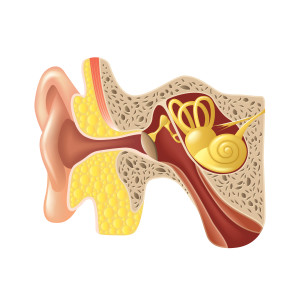 Ménière Disease and syndrome are defined by dizziness (usually room-spinning), one-sided hearing loss, and low-pitched tinnitus (ear ringing) due to increased fluid pressure in the ear (there is fluid normally present within the ear). The hearing loss may come and go, and there is sometimes a pressure sensation within the ear. In some cases, the cause of the increased pressure/blocked drainage is identified, while in others, it is not. For those that know, a number of treatments and preventions are prescribed in conventional medicine.
Ménière Disease and syndrome are defined by dizziness (usually room-spinning), one-sided hearing loss, and low-pitched tinnitus (ear ringing) due to increased fluid pressure in the ear (there is fluid normally present within the ear). The hearing loss may come and go, and there is sometimes a pressure sensation within the ear. In some cases, the cause of the increased pressure/blocked drainage is identified, while in others, it is not. For those that know, a number of treatments and preventions are prescribed in conventional medicine.
Hearing and balance mechanisms are both located in the inner ear, separated by a thin membrane. It is possible that food allergies may produce inflammation that increases ear pressure.[5]
Prognosis for Ménière disease/syndrome is exceedingly variable: some have a very minor bout that resolves quickly, others may experience a waxing and waning course ending in hearing loss. Otolaryngologists (ENT; ear, nose and throat specialists) perform various tests to diagnose the condition. Once diagnosed, common conventional treatments include dietary management (for identified food triggers), Antivert (anti-dizziness medication)/anti-histamines, steroids, and diuretics. There is a new, simple device being evaluated that provides intermittent pressure pulses to the ear that help to control symptoms. There are a number of surgeries and procedures reserved for very severe cases.[1]
Ménière Disease can be addressed with Neurological Scalp Acupuncture, especially the dizziness component. Tinnitus may or may not respond to a three-pronged treatment of scalp acupuncture plus ear electro-acupuncture, and Chinese Herbal Medicine. Hearing improvement may ensue, if there has not been permanent nerve damage prior to treatment. [2, 3, 4]
Neurological Conditions Testimonials
Learn more about Ménière Disease
X
These brief overviews of conditions represent distillations of basic and current medical reviews from the following sources:
[1] Conventional Medical Sources
“Harrison’s Principles of Internal Medicine: Volumes 1 and 2, 18th Edition”. Dan Longo Anthony Fauci, Dennis Kasper, Stephen Hauser, J. Jameson, Joseph Loscalzo. McGraw-Hill Professional; (July, 2011)
Medscape eMedicine Physician’s online resource. Various review articles:
Complex Regional Pain Syndromes Treatment & Management.
Anthony H Wheeler MD. Medscape Reference Chief Editor: Stephen A Beman, MD PhD MBA.
Essential Tremor
Deborah A Burke, MD Clinician, Sub-Investigator, Movement Disorder/Parkinson’s Disease Center, University of South Florida College of Medicine; Investigator, Physician, Roskamp Institute Memory Clinic
Bell Palsy
Danette C Taylor, DO, MS Clinical Assistant Professor, Department of Neurology and Ophthalmology, Michigan State University College of Osteopathic Medicine; Senior Staff Neurologist, Henry Ford Health Systems
Meniere Disease (Idiopathic Endolymphatic Hydrops)
John C Li, MD Private Practice in Otology and Neurology; Medical Director, Balance Center
Restless Legs Syndrome
Ali M Bozorg, MD Assistant Professor, Comprehensive Epilepsy Program, Departments of Neurology and Neurosurgery, University of South Florida College of Medicine
Postherpetic Neuralgia
W Alvin McElveen, MD Director, Stroke Unit, Lakewood Ranch Medical Center; Neurologist, Manatee Memorial Hospital
Sleep disorders
Roy H Lubit, MD, PhD Assistant Clinical Professor, Mount Sinai School of Medicine; Clinical Faculty, Department of Child Psychiatry, New York University School of Medicine; Private Practice
Tinnitus
Aaron G Benson, MD Director, Ohio Hearing and Balance Institute, Maumee, Ohio; Consulting Staff, Toledo Ear, Nose and Throat, Inc
Multiple Sclerosis
Christopher Luzzio, MD Clinical Assistant Professor, Department of Neurology, University of Wisconsin at Madison School of Medicine and Public Health
Parkinson Disease
Robert A Hauser, MD, MBA Professor of Neurology, Molecular Pharmacology and Physiology, Director, USF Parkinson’s Disease and Movement Disorders Center, National Parkinson Foundation Center of Excellence, Byrd Institute, Clinical Chair, Signature Interdisciplinary Program in Neuroscience, University of South Florida College of Medicine
Tourette Syndrome and Tic Disorders
William C Robertson Jr, MD Professor, Departments of Neurology, Pediatrics, and Family Practice, Clinical Title Series, University of Kentucky College of Medicine
Post Concussive Syndrome
Roy H Lubit, MD, PhD Assistant Clinical Professor, Mount Sinai School of Medicine; Clinical Faculty, Department of Child Psychiatry, New York University School of Medicine; Private Practice
Traumatic Brain Injury
Segun T Dawodu, MD, JD, MBA, LLM, FAAPMR, FAANEM Associate Professor of Rehabilitation Medicine and Interventional Pain Medicine, Albany Medical College
Dizziness, Vertigo, Imbalance
Hesham M Samy, MD, PhD Head of Hearing and Balance Unit, Otolaryngology Department, Minia University, Egypt
CNS Causes of Vertigo
Marcelo B Antunes, MD Resident Physician, Department of Otorhinolaryngology-Head and Neck Surgery, University of Pennsylvania Health System
Communication Disorders
Renee S Melfi, MD Consulting Staff, Orthopaedic Associates of Central New York
[2], [3]
- “Acupuncture Energetics: A Clinical Approach for Physicians”. Joseph M. Helms. Medical Acupuncture Publishers; 1st Edition. (1995)
- “Foundations of Chinese Medicine: A Comprehensive Text for Acupuncturists and Herbalists”. Giovanni Maciocia. Churchill Livingstone; 2 Edition (July, 2005).
- “Diagnosis in Chinese Medicine: A Comprehensive Guide”. Giovanni Maciocia. Churchill Livingstone; 1st Edition (January, 2004).
Chinese Scalp Acupuncture”. Jason Ji-shun Hao, Linda Ling-zhi Hao and Honora Lee Wolfe. Blue Poppy Press; 1st Edition. (November, 2011)
